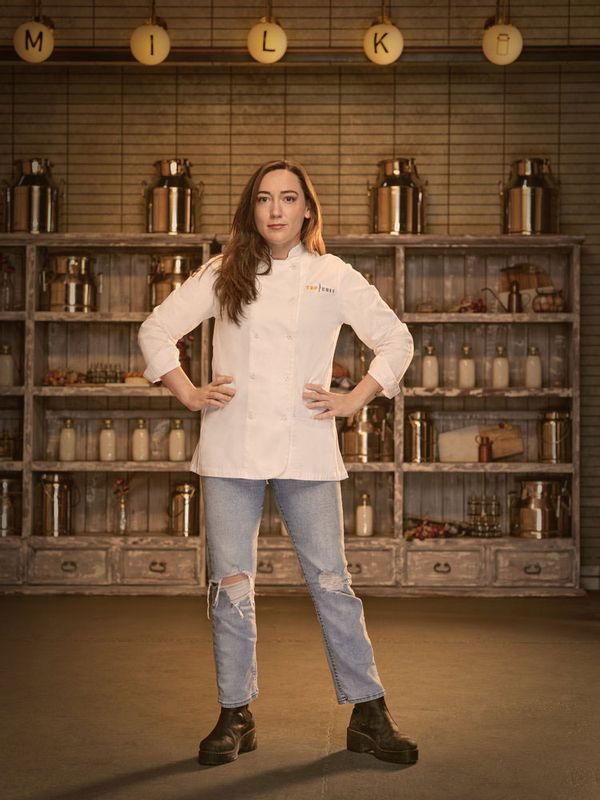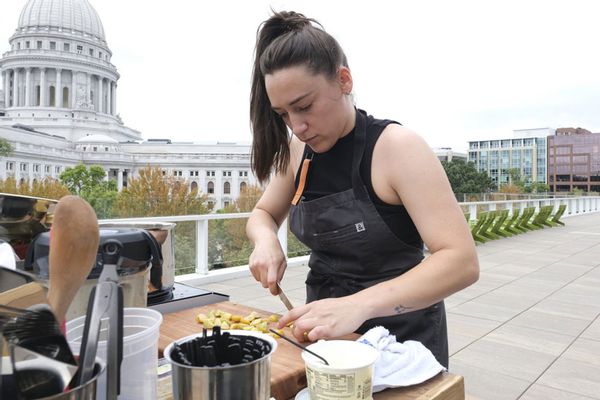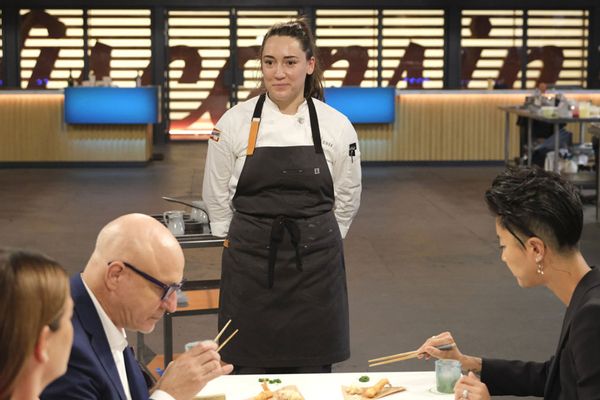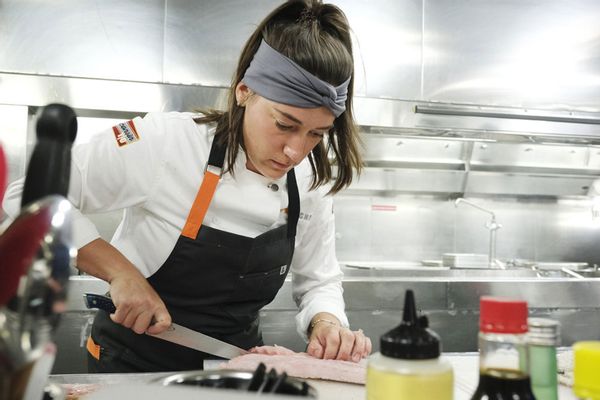
I'm a sucker for competitive reality TV and have been for over twenty years. Generally, though, I like the storylines, the editing, the competitive aspect and the psychological and sociological components more than any individual competitor. Every once in a while, though, a special contestant comes along and I root for this person with vim and vigor, much like one might root for a favorite sports team.
On "Top Chef: Wisconsin," that cheftestant was Chef Savannah Miller.
As noted right in my review of the very first episode, I noted that while Savannah's screen-time was limited (I don't even remember if she got any confessionals), her presence stood out and I loved the sound of her avgolemono sauce. But that was just the start.
Miller remained quiet and under the radar for the first five or six episodes, but she was a near-constant presence visually. This signaled me to the fact that she must become a significant competitor sometime down the road. And was I ever proven right.
In the episode "Chaos Cuisine," Miller first stood out, earning rave reviews for a dessert featuring mustard greens, along with a narrative through-line told both in confessional and to guest judge Matty Matheson that this was her attempt to right a wrong from years and years ago. And it paid off, putting her in the top three for the first time that season.
In the next two episodes, her presence was quieter again, but from "The Good Land" and on, Miller took off, winning multiple challenges and becoming the narrative force of the back-half of the season with practically more confessionals than any of her competitors. Many argued that she became the undisputed front-runner, a come-from-behind competitor who began clearly coming into her confidence, feeling her oats and positively dominating from there on out.
Over the course of the next four episodes (sans a bad cut and lackluster dish in episode ten), Miller would win at least one challenge per episode; in episode 12, Miller netted a "Top Chef" record, becoming one of the few over the course of the series to win both a QuickFire and an elimination challenge in one episode.
Unfortunately, though, the six-week break between the main competition in Wisconsin and the finale in Curacao and on a Holland America cruise ship seemed to put a halt to her amazing momentum. The final four challenge saw her fall to the bottom two, while the ingenuity and meticulousness she previously displayed seemed to get away from her in the big finale meal.
Nonetheless, Miller was a tour-de-force and a joy to watch and it should go without saying that I'm so thrilled to see where her career goes from here — or if she might appear on another "Top Chef" season sometime down the road!
Obviously, Miller had many top moments, but one that I think sort of encapsulated her entire "Top Chef" showing was her eloquent speech to the judges' as she presented her potato pave dish with chicken jus and charred onion-cherry sauce. She spoke about how a pave calls for nothing more than potatoes and a few other simple ingredients, but the real stars of the show are time, heat and pressure, which turn the humble potato into something extraordinary.
Miller likened the pave's journey to her own, and in doing so, not only met the challenge at hand, but also perfectly summed up her time on the show up until that point.
I had the pleasure to connect with Savannah to chat about her "come-up" in the industry, her preparations for the show, her strategizing during challenges, how "Top Chef" unlocked a ferocious competitiveness in her and her desire to "cement [her] name in the North Carolina restaurant scene" — and I have no doubt she will do just that.

Hi! I’m still amazed by your pave with cherry and onion sauce and chicken jus. I’m definitely going to make my own iteration of it one of these days. I coincidentally have an obsession with both chicken jus and charred onions and would love any tips you might have for making it?
I'm glad you enjoyed the dish. It was one of my favorites this season. Who doesn't appreciate chicken jus, onions, and potatoes? I love the idea of taking humble ingredients and elevating them, especially when it's a dish that feels so close to my personal journey in the season.
For the jus, I recommend getting a very good roast on your chicken bones prior to starting. More caramelization means a more intense flavor in the final product. The charred onions are so easy, just keep removing layers of the onion as it becomes charred, ensuring that every layer has an even cook. It can be slightly astringent at first, but the char also helps bring out some natural sweetness of the onion and I like to pair it with sweet ingredients to help balance the flavors.
I’d like to talk about your dessert in “The Good Land”. Kristen’s description made it sound amazing! What led to that inspiration?
My inspiration for the dessert in "The Good Land" was really of the moment.
Prior to us having to cook, Sean and Elena cooked us a meal to help inspire us. It really worked for me. We had a delicious dessert that was a variation of red bean jelly, and a sweet squash puree. I loved the textures and natural flavors that we were able to pick up on while eating it. I knew I wanted to do a dessert for my course, but after that meal and once I saw the ingredients available in the kitchen, I knew I wanted to do my take on something similar to the dessert we had the day prior.
In the beginning of episode 13, you mentioned that that indigenous challenge was part of “woke” you up and you haven't turned back since. What about that prompt do you think was so noteworthy for you?
The prompt of the challenge was ultimately to let the indigenous ingredients shine. That's an ethos I've carried with me throughout my career and something I go back to when I'm editing a dish.
I always ask myself, "Am I doing everything I can to highlight these ingredients and flavors?" Maybe that's toning a specific flavor down to enhance the overall balance of a plate, or it's limiting how much we're manipulating something from its original state. It's different every time, but I think the fact that honoring these ingredients was the ultimate goal in this challenge, I was able to relate to it better.
I also took many more risks than usual and really second-guessed myself leading up to the judges' table. You never know for sure how they will react, and I was so pleasantly surprised. After that episode, I gained more trust in myself to take risks and believe in my own decision-making in the kitchen.

Tell me a bit about your "pedigree" or your come up prior to Top Chef?
I grew up in Southern Pines, North Carolina and worked in a few corporate restaurant kitchens before attending culinary school at The New England Culinary Institute in Montpelier, Vermont. I graduated and moved to Massachusetts to work under Chef Matthew Jennings who owned and operated the restaurant Townsman in Downtown Boston. I started here fresh out of school and very green.
For almost four years, I gained an immeasurable amount of experience learning from not only Jennings, but every single person in that kitchen. I was able to use it as my training grounds, and I worked almost every position in that restaurant before eventually moving on. I was turning 22 and looking for a change of scenery, so I decided to move back to North Carolina, but to a city I had spent very little time in, Durham.
Over the course of the first year, I had a few different positions, ranging from being a full-time pastry chef to leading a small pop-up at night in a local bakery space. I met my mentor Mike Lee in 2018 while he was beginning to plan the opening of the third restaurant in his group called M Tempura, where I currently work. I've led this kitchen for the last 6 years with the exception of stepping away to help open Glasshouse Kitchen during the summer of 2022.
I find the fry, even just visually, on the fish you cook in Restaurant Wars and the pork you won the Quick Fire for to look excellent. Do you think that might be from working with tempura extensively? Or do you attribute that to something else?
I do have a lot of experience frying. Tempura frying is very specific and wildly different from the breading/cooking/resting of the fish or the pork loin, but it all comes down to the same skill set.
At M Tempura, we were open for lunch service for years prior to Covid, and I can't tell you how many pork katsus I've fried. I think just taking a little extra time and making sure you're doing things with care make a big difference.
It's so cool to see how well you've "done your research," like how you knew about the keshi yena, the lionfish, the wok in the Tom Quick Fire, etcetera. Is there anything in particular you attribute that to? Are you just especially perceptive?
I do feel like this experience brings out a certain "awareness" in a lot of people. I felt like I was always waiting for the next big surprise from producers, so I was on my toes the whole time and trying to take notes of things going on around us.
For the woks specifically, I would have definitely tried to use one already at that point in the competition if they had been there the whole time, so I knew they were placed recently.
As for the research done prior to the show, I will attribute it to being very competitive naturally but also my self-awareness of my own skills. I knew I wasn't going to be the most technically trained chef walking into that season or the one with the most kitchen experience. I had to work hard in other areas to have a fighting chance to win. We're all capable of researching and preparing, and I think a lot of us in Wisconsin did our homework. It left me with more time to be creative when I already knew the history and inspiration behind the challenge subjects.

Did you have a favorite challenge? Conversely, was there a challenge you weren’t especially enthused by?
My favorite challenge of the season was by far the indigenous challenge. I loved the concept of creating dishes using only ingredients that were sourced for us by Chef Sean and Chef Elena.
As chefs, we so often rely on things like dairy and cane sugar to provide depth and flavor to our food. This challenge was so unique and really pushed our limits.
For my least favorite, I would have to say it was the fish boil. Aside from injuring myself, I had a hard time feeling inspired by this challenge and my food suffered because of it. I also find a lot of creativity when shopping for my ingredients so while I loved the opportunity to work with Shota, I felt that I kept running into circumstances that affected my ability to perform the way I wanted to.
Which dish were you proudest of?
The dish I am most proud of this season is my mustard green dessert during the chaos challenge. I truly felt like I was pushing my limits conceptually and doing something that scared me, and to be rewarded for that was such a fantastic feeling. There was so much on the line for me during that cook. I needed to redeem myself from the original dish I had flopped on almost 10 years prior and the obvious pressure of being on "Top Chef" in the first place.
I gained so much confidence from this challenge because I took a risk, and it paid off. That feeling for me was addictive, and I wanted more of it.
Do you have a number one favorite ingredient to work with?
One of my all-time favorite ingredients to work with would have to be the humble egg. I really appreciate how versatile it is.
If you have eggs, you have the foundation to make such a wide variety of food: meringue, omelets, creme brûlée, carbonara, ice cream, aioli, and even chawanmushi!
In its simplest form, yolks can be cured and used to add salt and umami while finishing a plate, or you could add a runny yolk to literally anything to bring more fat and luxuriousness to a bite instantly. They can be used in so many technical problem-solving ways as well. Whipping the whites to create light and airy textures in desserts or tempering the yolks to thicken sauces and bases of all kinds.
Love eggs. Love 'em.
What was your favorite moment?
My favorite moment on air was when I saw Kristin's reaction to my jelly cake during the indigenous challenge. We always receive feedback during judges' table, but it's rare that we get to actually see the judges' immediate reactions to trying our food. I had no clue how much of a hit it was across the board, and it filled me with joy and pride to watch it for the first time.

Why do you cook? What stands out for you as a formative moment that got you into cooking or food at large?
I've been passionate about cooking and working in restaurants from a young age.
As a kid, going out to eat was my nirvana. It felt so ceremonial and special. I loved the production of choosing a restaurant, getting seated, and enjoying new and different foods.
My aspirations for being a chef grew as I got older and started working my first few jobs as a teenager. In high school, I worked in two restaurants during my senior year and spent more time on the line than I did going to class. I felt so drawn to the camaraderie of a team working in tandem to perform the nightly task of providing hospitality to their guests.
I've always felt that restaurants are so important to our communities and our ability to connect with other people. I think this belief is what ultimately drew me into kitchens in the first place, and along the way, I fell in love with the ability to self-motivate, communicate, and relate to others through cooking.
What is your favorite cooking memory?
I have a lot of really great cooking memories, but something that stands out is a story that comes from my time working as an intern at Townsman when I was 19.
I was tasked with making the pierogis for the restaurant. After weeks of making the dough, forming, and blanching them every other day, I got really good at it. Finally having something on the prep list that was specifically delegated to me because I had excelled at it felt good. I was straight out of school and surrounded by all-star cooks who could run laps around me. So, to receive that type of positive feedback from people you admire in a restaurant at that level, I didn't even care about how tedious of a prep task it was because it became special to me.
As time passed, I was able to teach various new employees the process, and those are fond memories for me as well. To be a young and inexperienced cook myself but still realize that I have knowledge worth passing on to others was invaluable.
What’s next for you?
Right now, I'm running the kitchen at M Tempura in Downtown Durham and really loving the interactions I get with our guests: The OG regulars and the new faces who are fans of the show.
My fiancé and I are planning our wedding for 2025 and are working to figure out what we want next.
I love this area and don't plan on leaving Durham anytime soon. My dream is to cement my name in the North Carolina restaurant scene and my ultimate goal is to open and operate my own businesses. Whether it's a restaurant space or something more catered to private events, I want to keep celebrating milestones with people and providing a place for any celebration, big or small.
After filming "Top Chef," I've also found a new passion for competition cooking and the entertainment industry as it relates to cooking. I'm not sure what the future holds, but I feel confident that this is just the beginning of a lot of new adventures, and I'm so grateful for it all.







